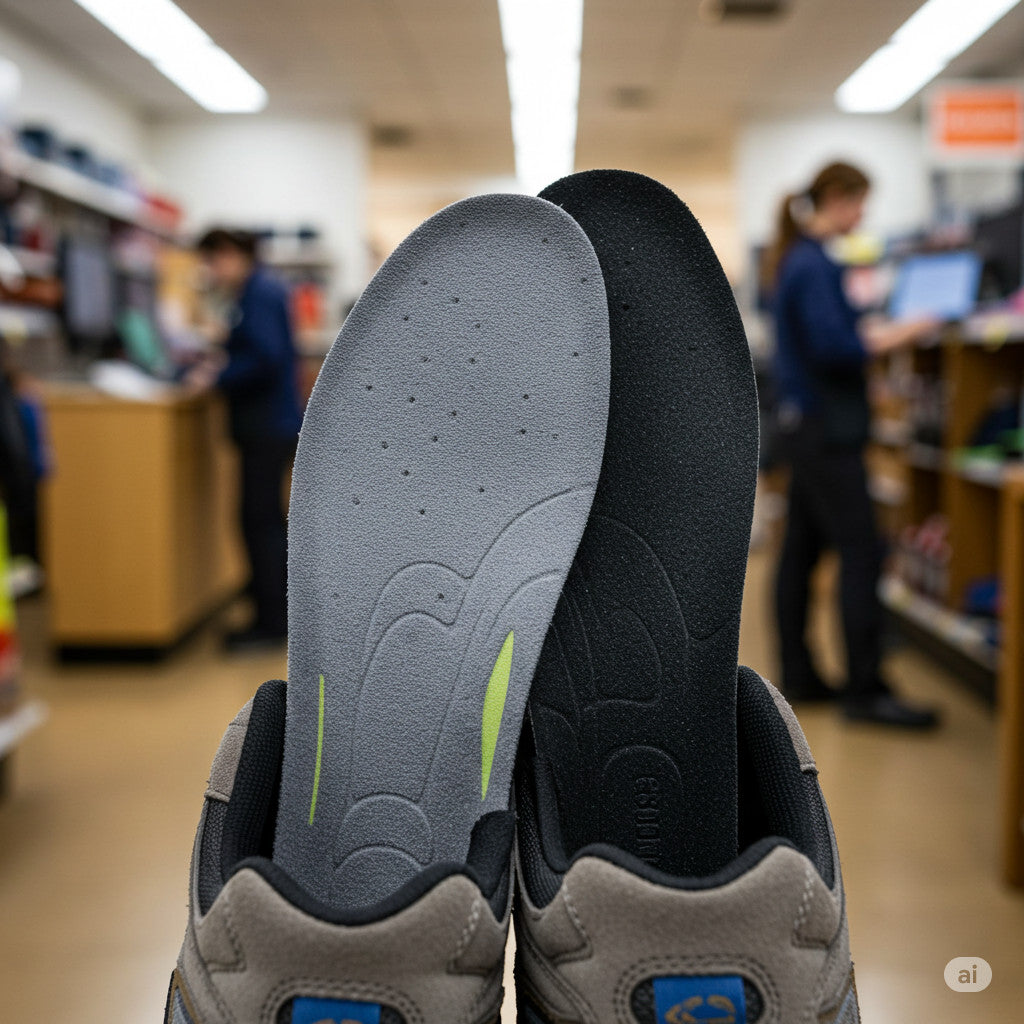
Giving Your Feet a Break: Finding the Best Insoles for Retail Warriors
Share
Retail work is tough on your feet. Long hours spent standing, walking, and often carrying items can lead to a variety of aches and pains, from general fatigue to more specific conditions like plantar fasciitis. While supportive footwear is a crucial starting point, the right pair of insoles can provide an extra layer of cushioning, support, and shock absorption that makes a world of difference for retail warriors.
But with so many options on the market, how do you choose the best insoles for your needs? This blog post will break down what to look for and highlight some popular choices that can help you stay comfortable and pain-free through your longest shifts.
Why Your Feet Hurt (and How Insoles Can Help)
Standing or walking for extended periods on hard retail floors puts significant stress on your feet, ankles, knees, hips, and even your lower back. This can exacerbate or lead to common foot problems, including:
- Plantar Fasciitis: Inflammation of the plantar fascia, the thick band of tissue running across the bottom of your foot, causing heel pain.
- Metatarsalgia: Pain in the ball of your foot.
- Arch Pain: Aching or stiffness in the arch of the foot.
- General Foot Fatigue: Tired, sore feet at the end of the day.
- Overpronation or Supination: Excessive inward or outward rolling of the foot, which can lead to misalignment and pain.
Good insoles can help address these issues by:
- Providing Arch Support: Supporting the natural arch of your foot helps distribute pressure evenly and reduces strain on the plantar fascia and other ligaments. Insoles come with different levels of arch support (low, medium, high) to accommodate various foot types.
- Offering Cushioning: Extra padding, particularly in the heel and forefoot, absorbs shock and reduces impact on your joints. Materials like foam, gel, or a combination are commonly used.
- Improving Stability: A supportive insole, often with a deep heel cup, can help stabilize your foot and ankle, preventing excessive movement that can lead to pain and injury.
- Reducing Fatigue: By providing proper support and cushioning, insoles can help reduce muscle fatigue and keep your feet feeling energized for longer.
Key Features to Look for in Insoles for Retail Workers
When choosing insoles for your retail job, consider these important features:
- Arch Support: Determine your arch type (low, neutral, or high) and choose an insole that provides appropriate support. Someone with flat feet (low arches) will need more aggressive arch support to prevent overpronation, while someone with high arches needs support to help distribute pressure.
- Cushioning: Look for insoles with ample cushioning, especially in the heel and forefoot areas that bear the most impact. Dual-layer cushioning can offer both softness and support.
-
Material: Different materials offer different benefits.
- Foam: Provides good cushioning and shock absorption. Memory foam can offer a plush, personalized feel but may compress over time. More resilient foams offer longer-lasting support.
- Gel: Excellent for shock absorption, particularly in the heel. Can sometimes add bulk.
- Cork: Molds to your foot over time for a customized fit and provides good support.
- TPU or Plastic: Used for the supportive shell or arch structure, providing stability and durability.
- Durability: Retail work is demanding, so you need insoles that can withstand hours of use. Look for quality construction and materials that won't break down quickly.
- Fit: The insoles should fit comfortably inside your work shoes without making them too tight. Some insoles are trimmable for a more customized fit. Consider the thickness of the insole, especially if your shoes have limited space.
- Moisture-Wicking: Materials that help wick away sweat can keep your feet dry and comfortable, preventing blisters and odor.
Popular Insole Options for Retail Work
Based on their features and popularity among those who spend long hours on their feet, here are a few types and brands of insoles often recommended for retail workers:
- Supportive Orthotic Insoles: Brands like Superfeet and PowerStep are well-regarded for their structured support and ability to help with conditions like plantar fasciitis and overpronation. They often feature a deep heel cup and a firm to semi-rigid arch support. Different models cater to various arch heights.
- Cushioned Work Insoles: Brands like Timberland PRO and Dr. Scholl's offer insoles specifically designed for work environments, focusing on anti-fatigue properties and heavy-duty cushioning. These are often thicker and built to absorb significant impact.
- Memory Foam Insoles with Support: Some insoles combine the plush comfort of memory foam with underlying support structures, offering a good balance of cushioning and stability.
- Customizable Insoles: Some brands offer heat-moldable or trim-to-fit options that allow for a more personalized fit to your specific foot shape. SprinSole omni custom insoles provide personalized arch support to energize every step in your life
Important Note: While many over-the-counter insoles can provide significant relief, if you experience severe or persistent foot pain, it's always best to consult a podiatrist. They can diagnose any underlying conditions and recommend custom orthotics if necessary.
Investing in Your Comfort
Your feet are your foundation, especially in a job that keeps you on them all day. Investing in a good pair of insoles isn't just about comfort; it's about protecting your foot health and preventing long-term issues. Consider your specific needs, shoe type, and budget when making your choice. With the right insoles, you can make those long retail shifts much more comfortable and keep your feet happy.
